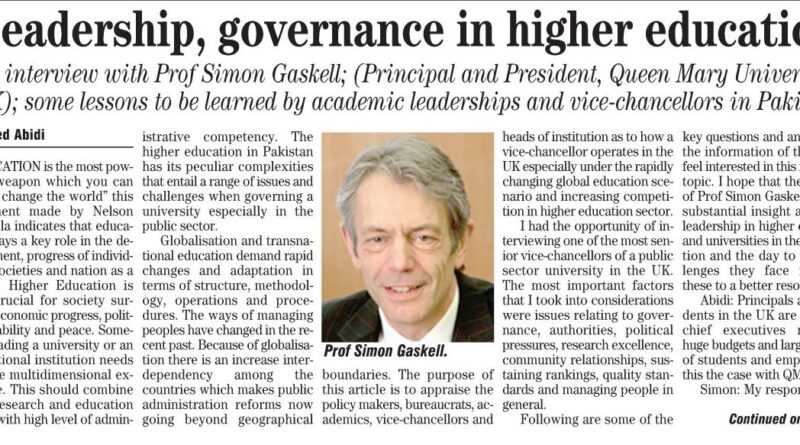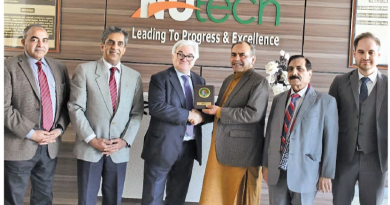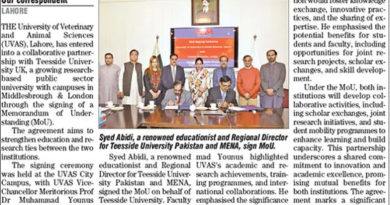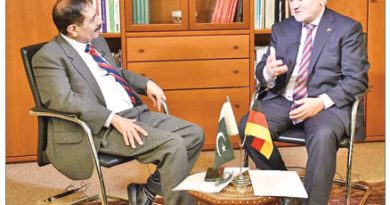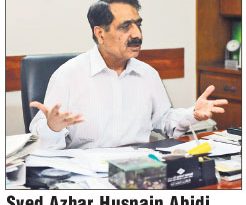An interview with Prof Simon Gaskell (Principal and President, Queen Mary University, UK)
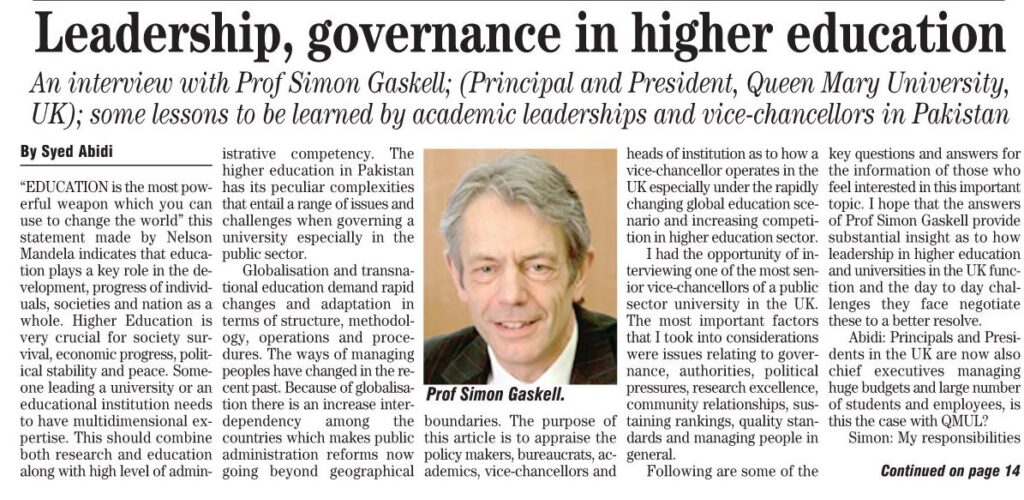
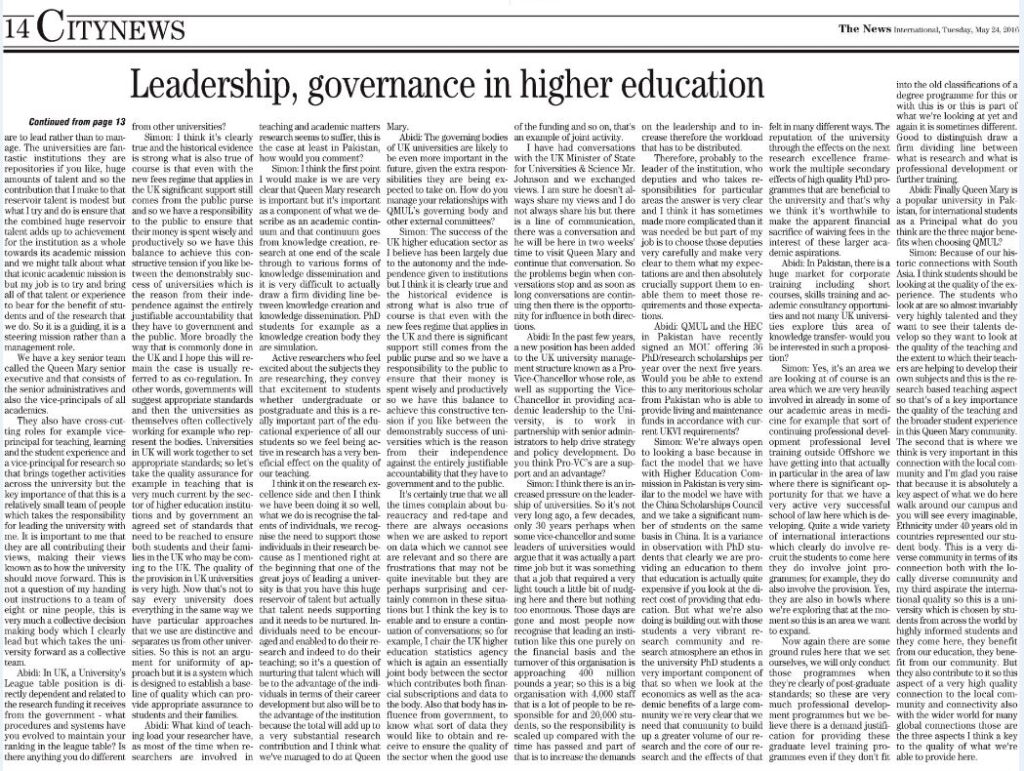
An interview with Prof Simon Gaskell; (Principal and President, Queen Mary University, UK); some lessons to be learned by academic leaderships and vice-chancellors in Pakistan
“Education is the most powerful weapon which you can use to change the world” this statement made by Nelson Mandela indicates that education plays a key role in the development, progress of individuals, societies and nation as a whole. Higher Education is very crucial for society survival, economic progress, political stability and peace. Someone leading a university or an educational institution needs to have multidimensional expertise. This should combine both research and education along with high level of administrative competency. The higher education in Pakistan has its peculiar complexities that entail a range of issues and challenges when governing a university especially in the public sector.
Globalisation and transnational education demand rapid changes and adaptation in terms of structure, methodology, operations and procedures. The ways of managing peoples have changed in the recent past. Because of globalisation there is an increase interdependency among the countries which makes public administration reforms now going beyond geographical boundaries. The purpose of this article is to appraise the policy makers, bureaucrats, academics, vice-chancellors and heads of institution as to how a vice-chancellor operates in the UK especially under the rapidly changing global education scenario and increasing competition in higher education sector.
I had the opportunity of interviewing one of the most senior vice-chancellors of a public sector university in the UK. The most important factors that I took into considerations were issues relating to governance, authorities, political pressures, research excellence, community relationships, sustaining rankings, quality standards and managing people in general.
Following are some of the key questions and answers for the information of those who feel interested in this important topic. I hope that the answers of Prof Simon Gaskell provide substantial insight as to how leadership in higher education and universities in the UK function and the day to day challenges they face negotiate these to a better resolve.
Abidi: Principals and Presidents in the UK are now also chief executives managing huge budgets and large number of students and employees, is this the case with QMUL?
Simon: My responsibilities are to lead rather than to manage. The universities are fantastic institutions they are repositories if you like, huge amounts of talent and so the contribution that I make to that reservoir talent is modest but what I try and do is ensure that the combined huge reservoir talent adds up to achievement for the institution as a whole towards its academic mission and we might talk about what that iconic academic mission is but my job is to try and bring all of that talent or experience to bear for the benefit of students and of the research that we do. So it is a guiding, it is a steering mission rather than a management role.
We have a key senior team called the Queen Mary senior executive and that consists of the senior administratives and also the vice-principals of all academics. They also have cross-cutting roles for example vice-principal for teaching, learning and the student experience and a vice-principal for research so that brings together activities across the university but the key importance of that this is a relatively small team of people which takes the responsibility for leading the university with me. It is important to me that they are all contributing their views, making their views known as to how the university should move forward. This is not a question of my handing out instructions to a team of eight or nine people, this is very much a collective decision making body which I clearly lead but which takes the university forward as a collective team.
Abidi: In UK, a University’s League table position is directly dependent and related to the research funding it receives from the government – what procedures and systems have you evolved to maintain your ranking in the league table? Is there anything you do different from other universities?
Simon: I think it’s clearly true and the historical evidence is strong what is also true of course is that even with the new fees regime that applies in the UK significant support still comes from the public purse and so we have a responsibility to the public to ensure that their money is spent wisely and productively so we have this balance to achieve this constructive tension if you like between the demonstrably success of universities which is the reason from their independence against the entirely justifiable accountability that they have to government and the public. More broadly the way that is commonly done in the UK and I hope this will remain the case is usually referred to as co-regulation. In other words, governments will suggest appropriate standards and then the universities as themselves often collectively working for example who represent the bodies. Universities in UK will work together to set appropriate standards; so let’s take the quality assurance for example in teaching that is very much current by the sector of higher education institutions and by government an agreed set of standards that need to be reached to ensure both students and their families in the UK who may be coming to the UK. The quality of the provision in UK universities is very high. Now that’s not to say every university does everything in the same way we have particular approaches that we use are distinctive and separates us from other universities. So this is not an argument for uniformity of approach but it is a system which is designed to establish a baseline of quality which can provide appropriate assurance to students and their families.
Abidi: What kind of teaching load your researcher have, as most of the time when researchers are involved in teaching and academic matters research seems to suffer, this is the case at least in Pakistan, how would you comment?
Simon: I think the first point I would make is we are very clear that Queen Mary research is important but it’s important as a component of what we describe as an academic continuum and that continuum goes from knowledge creation, research at one end of the scale through to various forms of knowledge dissemination and it is very difficult to actually draw a firm dividing line between knowledge creation and knowledge dissemination. PhD students for example as a knowledge creation body they are simulation.
Active researchers who feel excited about the subjects they are researching, they convey that excitement to students whether undergraduate or postgraduate and this is a really important part of the educational experience of all our students so we feel being active in research has a very beneficial effect on the quality of our teaching.
I think it on the research excellence side and then I think we have been doing it so well, what we do is recognise the talents of individuals, we recognise the need to support those individuals in their research because as I mentioned right at the beginning that one of the great joys of leading a university is that you have this huge reservoir of talent but actually that talent needs supporting and it needs to be nurtured. Individuals need to be encouraged and enabled to do their research and indeed to do their teaching; so it’s a question of nurturing that talent which will be to the advantage of the individuals in terms of their career development but also will be to the advantage of the institution because the total will add up to a very substantial research contribution and I think what we’ve managed to do at Queen Mary.
Abidi: The governing bodies of UK universities are likely to be even more important in the future, given the extra responsibilities they are being expected to take on. How do you manage your relationships with QMUL’s governing body and other external committees?
Simon: The success of the UK higher education sector as I believe has been largely due to the autonomy and the independence given to institutions but I think it is clearly true and the historical evidence is strong what is also true of course is that even with the new fees regime that applies in the UK and there is significant support still comes from the public purse and so we have a responsibility to the public to ensure that their money is spent wisely and productively so we have this balance to achieve this constructive tension if you like between the demonstrably success of universities which is the reason from their independence against the entirely justifiable accountability that they have to government and to the public.
It’s certainly true that we all the times complain about bureaucracy and red-tape and there are always occasions when we are asked to report on data which we cannot see are relevant and so there are frustrations that may not be quite inevitable but they are perhaps surprising and certainly common in these situations but I think the key is to enable and to ensure a continuation of conversations; so for example, I chair the UK higher education statistics agency which is again an essentially joint body between the sector which contributes both financial subscriptions and data to the body. Also that body has influence from government, to know what sort of data they would like to obtain and receive to ensure the quality of the sector when the good use of the funding and so on, that’s an example of joint activity.
I have had conversations with the UK Minister of State for Universities & Science Mr. Johnson and we exchanged views. I am sure he doesn’t always share my views and I do not always share his but there is a line of communication, there was a conversation and he will be here in two weeks’ time to visit Queen Mary and continue that conversation. So the problems begin when conversations stop and as soon as long conversations are continuing then there is the opportunity for influence in both directions.
Abidi: In the past few years, a new position has been added to the UK university management structure known as a Pro-Vice-Chancellor whose role, as well as supporting the Vice-Chancellor in providing academic leadership to the University, is to work in partnership with senior administrators to help drive strategy and policy development. Do you think Pro-VC’s are a support and an advantage?
Simon: I think there is an increased pressure on the leadership of universities. So it’s not very long ago, a few decades, only 30 years perhaps when some vice-chancellor and some leaders of universities would argue that it was actually a part time job but it was something that a job that required a very light touch a little bit of nudging here and there but nothing too enormous. Those days are gone and most people now recognise that leading an institution like this one purely on the financial basis and the turnover of this organisation is approaching 400 million pounds a year; so this is a big organisation with 4,000 staff that is a lot of people to be responsible for and 20,000 students, so the responsibility is scaled up compared with the time has passed and part of that is to increase the demands on the leadership and to increase therefore the workload that has to be distributed.
Therefore, probably to the leader of the institution, who deputies and who takes responsibilities for particular areas the answer is very clear and I think it has sometimes made more complicated than it was needed be but part of my job is to choose those deputies very carefully and make very clear to them what my expectations are and then absolutely crucially support them to enable them to meet those requirements and those expectations.
Abidi: QMUL and the HEC in Pakistan have recently signed an MOU offering 36 PhD/research scholarships per year over the next five years. Would you be able to extend this to any meritorious scholar from Pakistan who is able to provide living and maintenance funds in accordance with current UKVI requirements?
Simon: We’re always open to looking a base because in fact the model that we have with Higher Education Commission in Pakistan is very similar to the model we have with the China Scholarships Council and we take a significant number of students on the same basis in China. It is a variance in observation with PhD students that clearly we are providing an education to them that education is actually quite expensive if you look at the direct cost of providing that education. But what we’re also doing is building out with those students a very vibrant research community and research atmosphere an ethos in the university PhD students a very important component of that so when we look at the economics as well as the academic benefits of a large community we’re very clear that we need that community to build up a greater volume of our research and the core of our research and the effects of that felt in many different ways. The reputation of the university through the effects on the next research excellence framework the multiple secondary effects of high quality PhD programmes that are beneficial to the university and that’s why we think it’s worthwhile to make the apparent financial sacrifice of waiving fees in the interest of these larger academic aspirations.
Abidi: In Pakistan, there is a huge market for corporate training including short courses, skills training and academic consultancy opportunities and not many UK universities explore this area of knowledge transfer- would you be interested in such a proposition?
Simon: Yes, it’s an area we are looking at of course is an area which we are very heavily involved in already in some of our academic areas in medicine for example that sort of continuing professional development professional level training outside Offshore we have getting into that actually in particular in the area of law where there is significant opportunity for that we have a very active very successful school of law here which is developing. Quite a wide variety of international interactions which clearly do involve recruit the students to come here they do involve joint programmes; for example, they do also involve the provision. Yes, they are also in bowls where we’re exploring that at the moment so this is an area we want to expand. Now again there are some ground rules here that we set ourselves, we will only conduct those programmes when they’re clearly of post-graduate standards; so these are very much professional development programmes but we believe there is a demand justification for providing these graduate level training programmes even if they don’t fit into the old classifications of a degree programme for this or with this is or this is part of what we’re looking at yet and again it is sometimes different. Good to distinguish draw a firm dividing line between what is research and what is professional development or further training.
Abidi: Finally Queen Mary is a popular university in Pakistan, for international students as a Principal what do you think are the three major benefits when choosing QMUL?
Simon: Because of our historic connections with South Asia. I think students should be looking at the quality of the experience. The students who look at are so almost invariably very highly talented and they want to see their talents develop so they want to look at the quality of the teaching and the extent to which their teachers are helping to develop their own subjects and this is the research based teaching aspect so that’s of a key importance the quality of the teaching and the broader student experience in this Queen Mary community. The second that is where we think is very important in this connection with the local community and I’m glad you raise that because it is absolutely a key aspect of what we do here walk around our campus and you will see every imaginable, Ethnicity under 40 years old in countries represented our student body. This is a very diverse community in terms of its connection both with the locally diverse community and my third aspirate the international quality so this is a university which is chosen by students from across the world by highly informed students and they come here, they benefit from our education, they benefit from our community. But they also contribute to it so this aspect of a very high quality connection to the local community and connectivity also with the wider world for many global connections those are the three aspects I think a key to the quality of what we’re able to provide here.

